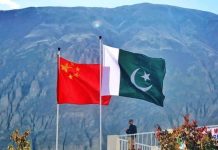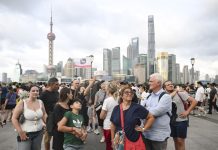Hong Kong: Hong Kong has made an “irreplaceable contribution.” Since its return, it has contributed greatly to the motherland’s long-term, steady and fast economic growth, President Xi Jinping said on July 1.
It has become an integral part of the country’s overall development and actively aligned with national development strategies, Xi said at a meeting celebrating the 25th anniversary of Hong Kong’s return to the motherland and the inaugural ceremony of the sixth-term government of Hong Kong Special Administrative Region (SAR).
The Central Government fully supports Hong Kong in aligning with national development strategies, developing more extensive and closer exchanges and cooperation with the world, advancing reforms in an active and prudent manner and fully unleashing the enormous creativity and development vitality of Hong Kong society, he said.
At the ceremony, Xi administered the oath of office to the sixth-term Chief Executive John Lee Ka-chiu and other principal officials. Shortly before the celebrations, the State Council rolled out new measures to further open up a district in its neighboring Guangdong Province to enhance the integration of the Guangdong-Hong Kong-Macao Greater Bay Area (GBA).
An overall plan with detailed measures to promote the development of Nansha District in Guangzhou, capital of Guangdong Province, was released on June 14 in a bid to deepen comprehensive cooperation within the GBA. Nansha, three decades ago an underdeveloped stretch of land in southernmost Guangzhou, in recent years has developed into a new favored place within the GBA following Qianhai in Shenzhen, and Hengqin New Area in Zhuhai, both in Guangdong.
The overall plan is expected to inject new momentum into the development of the GBA and Hong Kong.
Then Chief Executive of Hong Kong SAR Carrie Lam Cheng Yuet-ngor encouraged different sectors of society to proactively seize the opportunities generated by the new plan in Nansha and join hands in taking forward the development of the GBA.
“Hong Kong has the institutional strength of One Country, Two Systems and offers a first-class business environment,” Lam said on June 16.
Lee has also underlined the need for Hong Kong to seize opportunities produced by the GBA to align the region with China’s mainland and the rest of the world. Lee is the sixth-term chief executive of Hong Kong SAR and the first one after the Improving Electoral System (Consolidated Amendments) Bill was implemented in the region in 2021.
The new electoral system and the Law of the People’s Republic of China on Safeguarding National Security in Hong Kong SAR (National Security Law in Hong Kong) are two major steps that the Central Government took to put Hong Kong back on the right track after the social unrest in 2019.
The law, adopted on June 30, 2020, has clearly defined four categories of crimes that severely endanger national security and their corresponding penalties, as well as established and improved the enforcement mechanisms for safeguarding national security at the levels of both the Central Government and Hong Kong SAR.
The new electoral system followed in 2021. The amended Annex I and Annex II to the Basic Law of Hong Kong SAR, respectively concerning the method for electing the Hong Kong SAR chief executive and the method for the formation of the Hong Kong SAR Legislative Council (LegCo) and its voting procedures, were passed during a session of the National People’s Congress (NPC) Standing Committee in March of the year.
Under the new electoral system, the Hong Kong SAR Election Committee, originally established for the nomination and election of the chief executive, was reformed and given greater authorization. Its membership has been expanded from 1,200 to 1,500 and it now features two more key functions: electing a relatively large proportion of LegCo members and participating in the nominations of all LegCo candidates. LegCo membership has also been increased from 70 to 90.
“The 25-year practice of the One Country, Two Systems policy in Hong Kong SAR is a unique exploration of an innovative governance framework,” Henry Ho, founder and Chairman of the One Country Two Systems Youth Forum, told Beijing Review. “The quarter-century journey wasn’t all smooth sailing, though.”
The misinterpretation of the policy resulted in a severe situation, including violent incidents and the calls for “Hong Kong independence,” according to Ho. “One country is the premise of the two systems, but the latter for a long time received more attention—before and after Hong Kong’s return to the motherland.”
–The Daily Mail-Beijing review news exchange item






